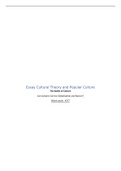Essay Cultural Theory and Popular Culture
The Battle of Culture
Can Cultures Survive Globalisation and Racism?
Word count: 4277
, Introduction
The disappearance of cultures and traditions is not a phenomenon of the last few years. It
has always happened. Nowadays, it is more in the picture because of the new technologies
and globalisation. An essential factor in the preservation of cultures is whether these
cultures are experiencing racism or cultural globalisation.
Therefore, this essay will focus on different themes from the book of John Storey’ Cultural
Theory and popular Culture’, of which globalisation and racism and their relation to creating
a world culture and thus the elimination of the culture of minorities. In the body of the
essay, with the help of real-world examples, it will be discussed and investigated what the
consequences are of the topics mentioned in the introduction.
Ever since the dawn of time, cultures mainly have been developing and changing in a
significant way. This essay will mainly look at the first definition of culture according to
Raymond Williams. Williams (as cited in Storey, 2021) stated that culture can be defined as
“a general process of intellectual, spiritual and aesthetic development and a particular way
of life, whether of a people, period or a group” (p. 2). Globalisation, industrialisation and
technology have become an unavoidable aspect of everyday life. Despite the fact that
globalisation is commonly thought of as a political or economic process, people often forget
that it also has a significant impact on the cultural effect on people (Syamalamma & Reddy,
2009, p. 14). The debate that is currently in play is about cultural globalisation.
According to Castells (2009), cultural globalisation “refers to the emergence of a specific set
of values and beliefs that are largely shared around the planet” (p. 117). In other words, this
means the creation of a shared culture by the majority of the world with the same values
and beliefs. Furthermore, it is said that mass media plays a significant role in this cultural
globalisation because it is a platform where products or information from different parts can
be spread around the world (Movius, 2010, p. 6).
According to Storey (2021, p. 230), globalisation may make the world and its differences
smaller; it also provides conflict in the world. While some people welcome the emergence
of cultural globalisation, others oppose it, as they believe that it will damage their own local
culture and traditions. The people who say that it will damage their own cultural beliefs are
right in some ways. This will be further explained in the body of this essay.






